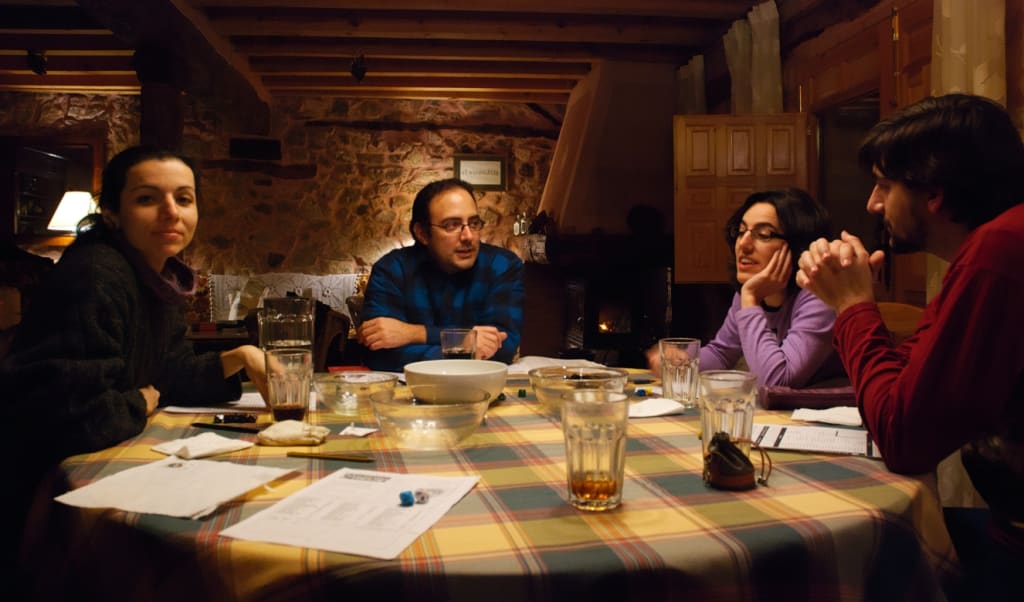How to Keep Players in Your Campaign
Fairness in Role-Playing Games

You've known those Dungeon Masters. This is their campaign. They're in charge here. They've got their way of doing things and you better get used to it because that's how the game is played at this table. Want to run in their world? Get used to feeling their eye upon you; get used to a sharp rebuke for doing it wrong. Get ready to bend. Because if you want to play in this world, you're going to play the game their way.
Why do some DMs play like this? Is it that they like power? Are they bullies? That's an easy explanation. I have to question if it's right. A lot of these DMs play for years like this and a lot of them manage to retain regular players - though, from my experience, such players are rarely happy. So what's going on here?
For DMs who worked their way up through the adventuring fields of high school, keeping order was the biggest problem. Young players can be a disorganized nightmare, making a DM think: "If I'm going to get these players to listen to me, I've got to get them to respect me." By respect, they mean fear. They mean retribution.
We've all done it. We've cut players off; we don't have time to listen when we're pushing our agenda. We've let our generosity shine on players who behaved better, ran better, gave us less trouble and such. And we have arbitrarily, even in plain view, leveled the finger of death against a player character we've thought deserved a short life. Even if we don't run a game this way now, we all did when we were 15. We were little bastards at 15.
It doesn't work, however. It doesn't make people behave. It doesn't teach players to stop talking or trying to talk. And players that annoy us don't see the error of their ways when their characters die.
If we're not the sort of DM that wants to be Draconian, we can see this immediately. We wouldn't play in a world with a DM who tried to "teach" us how to play with various punishments. We'd call someone like that unfair and walk. But there are many voices who shout that this is the only viable way to play. The DM has the final say in any game, period.
I'm happy to say this isn't where we are. There are better places where we can go, better games we can run. Where respect isn't a stand-in word for fear. It boils down to our willingness to run campaigns like adults and not like spoiled children who must have our way.
Players will quiet and listen when they feel they are being treated right. Every player needs to feel that what they say matters and is being heard. Every player needs to feel that they are being treated exactly the same as any other player. And every player needs to feel a sense of trust; that the DM isn't jacking them just because the DM can.
If you want players to embrace you as a DM, get off your high horse. Get rid of the DM's screen and anything else that says you're better or different from others. Show an interest in what players want to tell you before and after the running; if they want to show you a drawing of their character, praise it. If it is awful, find a way to praise it. Suck it up. They're asking your opinion because they respect you. Give them a reason to go on respecting you.
If they want to pitch a rule idea at you, say things that demonstrate you heard every word. Implement ideas the players propose just because they propose it. Obviously, pick and choose, but choose something. The players want to feel they have the power to influence you, at least a little. Let yourself be influenced.
Never, ever, show preferential treatment for anyone. Unless you can wrap it up in five minutes, never run any adventure at the table that doesn't involve all the players. If someone wants to go at it alone, figure out a way to fast-track the experience or figure out a way to ensure the lone figure needs help. Everyone's help. If someone repeatedly insists on going on lone missions, take them aside and explain to them patiently that this isn't how you're going to play. Don't punish them. Invite them to change their behaviour on everyone's account, or else they won't be welcome. We may lose a player this way, but the rest of the party will be heartily grateful.
We have to be absolutely honest. No fudged die rolls, no arbitrary decisions of any kind. Never make something bad happen to the players because it "seems" appropriate or funny. Even if their characters aren't hurt, we're making the player the butt of a joke and they won't like it. Singling out someone for any sort of shame, just because we've had a whim that it will speed up the game, create momentum or any other excuse we can invent, is just bad judgement. We are sowing resentment.
It is nearly impossible to make a constantly arbitrary DM understand that momentary flashes of creativity are not a good basis on which to build up trust and respect in others. Random behaviour is always seen as aggressive and uncertain. We like it when people act just like we'd expect them to act. When I hear DMs say, "It builds drama," I think immediately of drama queens and why we don't like them.
Good games are made of good adventure ideas, unexpected opportunities, novel encounters and rewards that feel they've been gained through perseverance and originality. None of those things require the player to feel disregarded, left out or used. It may be understandable for a DM who feels harried to lash out and strike at others who don't seem to approve enough of the DM's efforts, but that is a terrible, awful way to win over the loyalty and admiration of players, who we want to love our game nights.
Listen to them, give fairly and serve as a model for behaviour and players will see the wisdom of coming again and again, for as long as we care to run.
About the Creator
Alexis D. Smolensk
For more content, see The Tao of D&D: http://tao-dnd.blogspot.ca/ and my game wiki at http://tao-of-dnd.wikispaces.com/General+Index. Please support my Patreon: https://www.patreon.com/user?u=3015466
Enjoyed the story? Support the Creator.
Subscribe for free to receive all their stories in your feed. You could also pledge your support or give them a one-off tip, letting them know you appreciate their work.






Comments
There are no comments for this story
Be the first to respond and start the conversation.